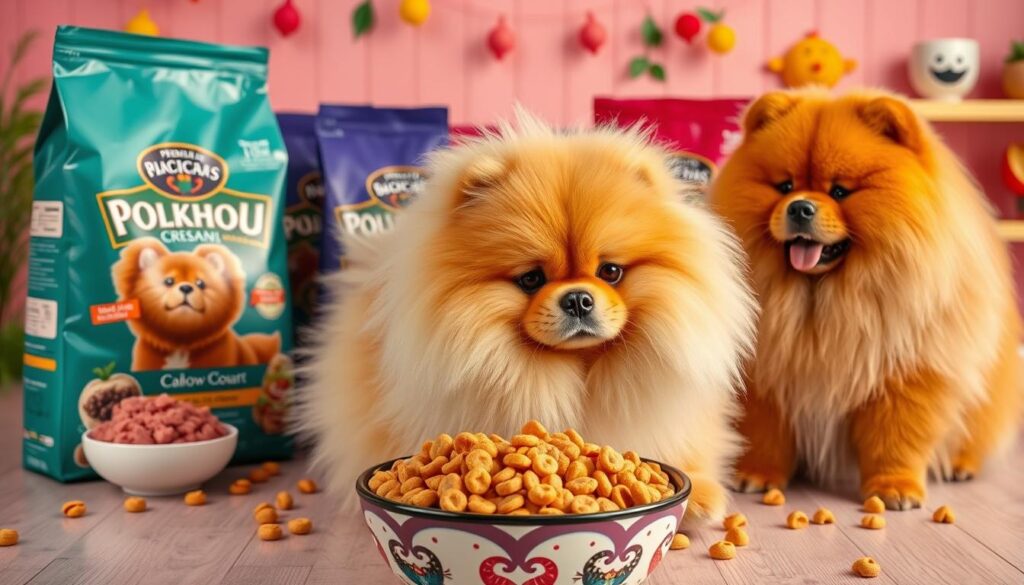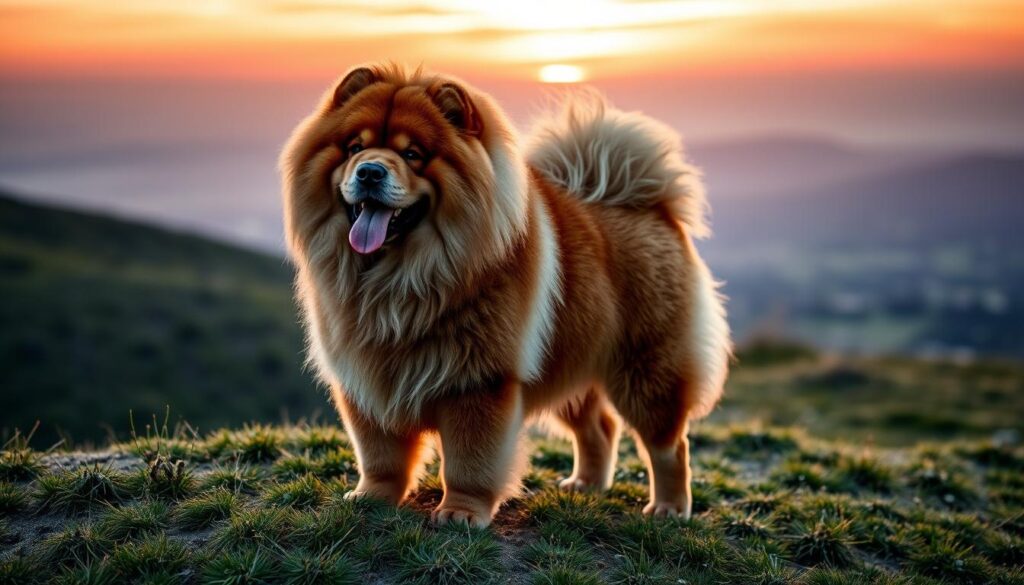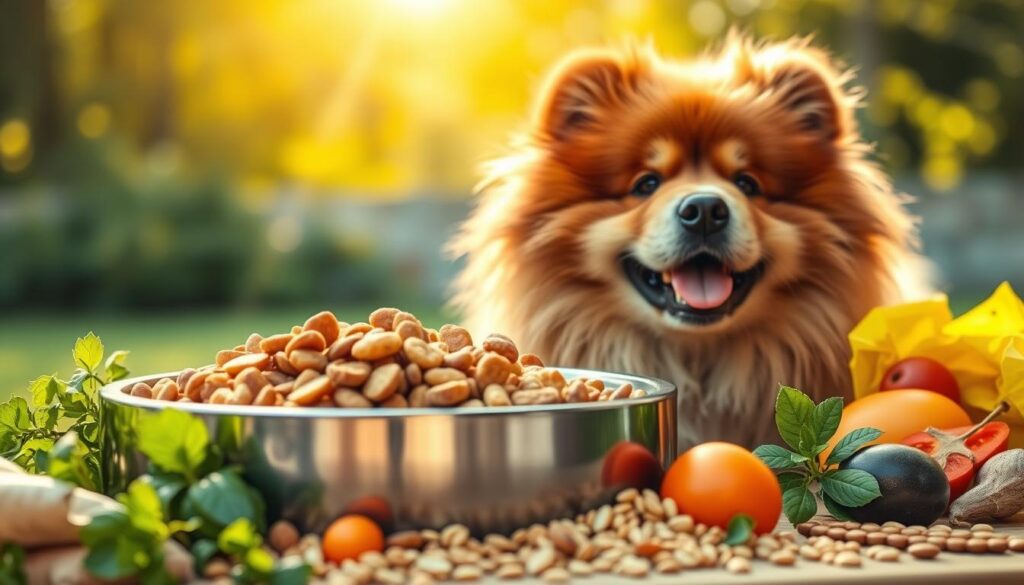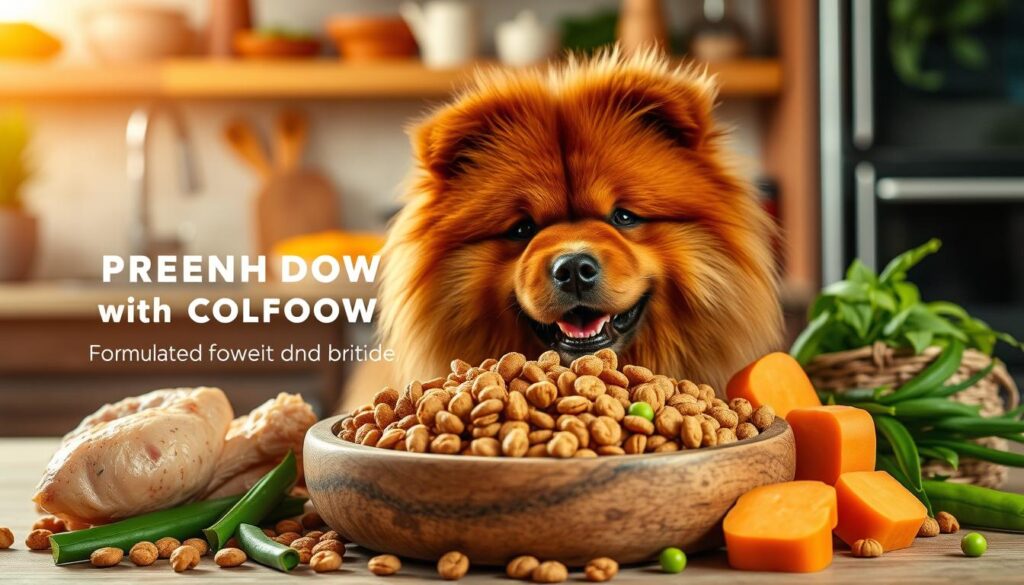As a devoted Chow Chow owner, I know how vital it is to feed them well. These majestic pups need special food to stay healthy. In this guide, we’ll look at the best food for Chow Chows. This will help you choose the right food for your pet.
Table of Contents
Understanding Your Chow Chow’s Nutritional Needs
As a proud Chow Chow owner, it’s key to know their special diet needs. Chow Chows have a regal look and strong build. This means their food needs are different from other dogs. By choosing the right food, you help keep your Chow healthy and full of energy.
Essential Nutrients for Optimal Health
Chow Chows need a diet full of quality protein, healthy fats, and complex carbs. These nutrients help their muscles grow, keep them energetic, and support their health. They also need vitamins and minerals for a shiny coat, strong bones, and a strong immune system.
Caloric Requirements Based on Age and Activity
The calories a Chow Chow needs change with age and activity level. Puppies and young Chows need more calories for fast growth. Older, less active Chows need fewer calories to stay healthy. Watching your Chow’s body condition and adjusting their food is crucial.
Special Dietary Considerations for Chow Chows
Chow Chows can face health issues like joint problems and skin sensitivities. Choose a pet food that helps with joint health and coat care. Some Chows might do better on a grain-free or limited-ingredient diet to avoid allergies or intolerances.
| Nutrient | Recommended Amount for Chow Chows |
|---|---|
| Protein | 22-30% of total caloric intake |
| Fat | 12-18% of total caloric intake |
| Carbohydrates | 30-40% of total caloric intake |
Choosing Between Dry and Wet Food Options
Feeding your dog chow chow can be done in two ways: dry kibble or wet canned food. Each has its own benefits and things to think about. Pet owners need to weigh these carefully to find the best food for their dog.
Dry dog chow chow kibble is easy to use and lasts a long time. It’s cheaper and helps keep teeth clean. But, wet food might taste better and has more water, which is good for dogs who get dehydrated easily.
| Dry Kibble | Wet Food |
|---|---|
|
|
Choosing between dry and wet chow chow dog food depends on your dog chow chow‘s needs and your lifestyle. Talking to your vet can help you make the right choice. This ensures your dog chow chow gets the best nutrition and best pet food for chow chow and stays hydrated.
Best Pet Food for Chow Chow: Top Brands Review
Choosing the best pet food for chow chow is key. Look for brands that meet their special needs. From top kibble to wet food and grain-free options, we’ll cover the best choices for your dog’s health.
Premium Kibble Options
Premium kibble is a best pet food for Chow Chow. It offers a balanced diet. Here are some top picks:
- Orijen Tundra Grain-Free Dry Dog Food
- Acana Homestead Harvest Dry Dog Food
- Purina Pro Plan Sport 30/20 Salmon & Rice Formula
Wet Food Recommendations
Wet food adds moisture and nutrients to your Chow Chow’s diet. Check out these quality options:
- Wellness CORE Grain-Free Wet Dog Food
- Instinct by Nature’s Variety Raw Boost Wet Dog Food
- Merrick Purrfect Bistro Grain-Free Wet Dog Food
Grain-Free Alternatives
Grain-free food is also best pet food for Chow Chow with sensitivities. Here are some top picks:
| Brand | Product | Key Features |
|---|---|---|
| Taste of the Wild | High Prairie Grain-Free Dry Dog Food | Formulated with bison, venison, and legumes |
| Blue Buffalo | Wilderness Grain-Free Dry Dog Food | Contains nutrient-rich fruits and vegetables |
| Rachael Ray Nutrish | Zero Grain Dry Dog Food | Made with real meat as the first ingredient |
Choosing the best pet food for chow chow ensures your Chow Chow gets the best nutrition. This helps them thrive.

Size-Specific Nutrition for Chow Chow Dogs
Chow Chow Dog size, Chow Chows are medium-to-large dogs. Their size affects their nutritional needs. It’s important to meet these needs for their health and happiness.
Chow Chows have a fluffy coat and a strong build. Their looks mean they need special food all their lives.
Portion Sizes and Nutrient Ratios
Dog Chow Chow need more food than smaller dogs. The right amount depends on their age, how active they are, and their health.
- Adult Dog Chow Chow need 30-40 calories per pound of body weight each day. This keeps them energetic and strong.
- Puppies and older Chows might need more or less food. This helps them grow or stay healthy as they age.
- It’s also important to balance their diet. They need the right mix of proteins, fats, carbs, and vitamins and minerals.
Feeding Strategies for Chow Chows
Feeding a Dog Chow Chow is a careful task. Their needs change over time. Here are some tips to help:
- Feed them two to three smaller meals a day. This helps with digestion and prevents them from eating too much.
- Watch their body condition and adjust their food. This keeps them at a healthy weight and muscle tone.
- Talk to your vet about the best food for your Chow Chow. It should match their size and needs.
Customizing your Dog Chow Chow’s diet supports their health and energy. Keep an eye on their diet and make changes as needed. This helps them live a long, happy life.

Common Food Allergies and Sensitivities in Chow Chows
As a responsible Dog Chow Chow owner, knowing about food allergies and sensitivities is key. These issues can cause discomfort and serious health problems if ignored. Understanding common triggers and managing them can keep your Chow Chow happy and healthy.
Identifying Food Intolerances
Dog Chow Chows, like many dogs, can have food allergies and sensitivities. Common culprits include proteins like beef, chicken, or dairy, and grains like wheat, corn, and soy. Signs of food intolerance in Chow Chows include:
- Skin irritation and inflammation
- Gastrointestinal issues like diarrhea or vomiting
- Excessive scratching or licking
- Ear infections
- Lethargy or decreased energy levels
Hypoallergenic Food Options
If your Dog Chow Chow shows signs of a food allergy or sensitivity, work with your vet to find the cause. Then, switch to a hypoallergenic diet. These diets use limited, novel, or hydrolyzed proteins that are less likely to cause an immune reaction. Some good chow chow dog food options include:
- Venison and potato-based formulas
- Salmon and sweet potato recipes
- Hydrolyzed protein kibble
Managing Dietary Restrictions
Managing your Chow Chow’s dietary restrictions is crucial for their health. This includes:
- Carefully reading ingredient labels to avoid known allergens
- Introducing new foods slowly and in small amounts to monitor for reactions
- Maintaining a consistent feeding schedule and routine
- Consulting with your veterinarian to ensure your Chow Chow’s nutritional needs are met
By being proactive about food allergies and sensitivities, you can help your Chow Chow live a happy, healthy life. A little extra care and attention can make a big difference in your furry friend’s well-being.

Age-Appropriate Feeding Guidelines
Feeding your dog chow chow is a delicate task, changing with each life stage. To give your Chow Chow the best pet food, knowing the age-specific guidelines is key.
Puppyhood: Fueling Growth and Development
Chow Chow puppies need a special diet for their fast growth. They require more protein, fat, and calories than adult dogs. Adjust their food portions based on their age and how active they are, feeding them several times a day.
Adult Years: Maintaining Optimal Health
When your Chow Chow grows up, their diet needs to change. They need a balanced, high-quality adult dog chow chow food. Watch their food portions to avoid obesity, which can cause health problems.
Senior Stage: Supporting Aging Gracefully
As your Chow Chow gets older, their diet needs to change again. Senior dog chow chow foods have fewer calories, more fiber, and supplements for joints and brain health. Talk to your vet to find the right pet food for chow chow in this stage.
Keep in mind, your Chow Chow’s diet can change based on their activity, health, and likes. Following these feeding guidelines helps your furry friend stay healthy and happy all their life.
Raw Diet vs. Commercial Food for Chow Chows
Feeding your Chow Chow can be a tough choice between raw diets and commercial pet foods. Each option has its own benefits and things to consider. The right choice depends on your dog’s needs and what you prefer.
Benefits and Risks of Raw Feeding
Raw diets are seen as more natural for Chow Chows. They offer high-quality proteins, fats, and vitamins. But, there are risks like bacterial contamination and dental problems if not balanced right.
Transitioning Between Diets
Switching your Chow Chow’s diet should be done slowly. Start with small amounts of the new food over days or weeks. Watch how your dog reacts and get help from a vet or nutritionist.
Choosing between raw diets and commercial foods for your Chow Chow is a big decision. It’s important to weigh the good and bad of each. With the right advice, you can make sure your Chow Chow gets the best food for their health.
Feeding Schedule and Portion Control
Keeping your chow dog healthy is more than picking the right food. It’s also about the right amount and timing. This ensures they get the nutrients they need without gaining too much weight.
Meal Frequency for Chow Chows
Chow Chows do best with a regular eating schedule. They should eat two to three times a day. This keeps their metabolism steady and stops them from eating too much.
Portion Sizes
The right amount of food for your Chow Chow depends on their age, how active they are, and their size. Adult Chow Chows need about 25-30 calories per pound of body weight each day. This is split into their meals. Puppies and older Chow Chows might need more or less, so watch their weight and adjust their food as needed.
Preventing Obesity
- Use a measuring cup to make sure your dog gets the right amount of food.
- Don’t let them eat all the time, as this can lead to weight gain.
- Make sure they get lots of exercise and playtime to keep their size in check.
- Talk to your vet if you’re worried about your Chow Chow’s weight or how much they eat.
By sticking to a regular feeding schedule and controlling portions, you can help your Chow Chow stay healthy. Every dog is different, so be ready to change their diet as they grow and change.
“Proper feeding and portion control are essential for the overall health and well-being of your Chow Chow.”
Conclusion
Feeding your Chow Chow the best food is key for their health. Knowing what they need helps you choose the right food. This supports their growth and keeps them healthy.
Choose from premium kibble, wet food, or grain-free options. Pick a high-quality brand that fits your Chow Chow’s needs. Think about their age, how active they are, and any food allergies.
Working with your vet is crucial. They can help create a diet plan that’s just right for your Chow Chow. This way, your pup can live a long, happy, and healthy life.

